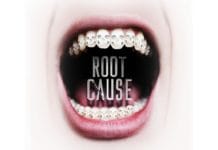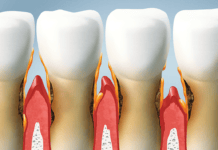According to the Alzheimer’s Association, it is estimated that 6.7 million people in the United States over the age of 65 are living with Alzheimer’s disease.1 Considering the projected increases in life expectancy, that number might reach nearly 13 million by 2050.1
In 2019, Alzheimer’s was the sixth leading cause of death in the United States.1,2 In 2020 and 2021, since COVID-19 entered the ranks of leading causes of death, Alzheimer’s is now the seventh leading cause of death in the United States.1,2 For Americans 65 and older, Alzheimer’s is the fifth leading cause of death.2 One in three older adults dies with Alzheimer’s or another form of dementia.1
Association Between Oral Health and Cognitive Impairment
An increasing amount of data demonstrates that oral diseases such as periodontal disease and tooth loss are connected with an elevated risk of cognitive impairment, including Alzheimer’s.3-5 Research looking into the connection between oral health and cognitive impairment and decline continues to be a focus because of the prevalence of both poor oral health and cognitive diseases worldwide.
Many hypotheses exist regarding the link between oral health and cognitive impairment. It has been hypothesized that less hippocampus activation results from weaker mastication while chewing foods without natural teeth, compromising mental well-being.6 It has also been shown that persons with more extensive tooth loss tend to have worse cognitive performance. Other research has shown that pathogenic oral bacteria can cross the blood-brain barrier and produce enzymes that damage nerve cells.4 Plaques made of beta-amyloid protein in the brain have been recognized as a sign of Alzheimer’s, and researchers have hypothesized that these plaques are created as the body’s response to oral pathogens entering the brain.4
Despite the publication of many systematic studies on the subject, there is no definitive agreement on the specific link between Alzheimer’s, other dementias, and oral health. Therefore, the need for research that uses high-quality data, larger sample sizes, and more refined assessments of focus variables and covariates continues to exist.
Recent research lending support to the connection between cognitive decline and oral health was undertaken by Wu and colleagues. They focused on tooth loss and cognitive decline using data from the Chinese Longitudinal Healthy Longevity Survey conducted in 2002, 2005, 2008, 2011, 2014, and 2018. The Chinese population was chosen because China hosts one-quarter of the world’s geriatric population.6
Study Results
This investigation used regression models to analyze data collected in six waves from the Chinese Longitudinal Healthy Longevity Survey (CLHLS) over a period of 16 years. The sample size was 43,207 participants with 69,989 observations (i.e., 1.6 repeated measures by participants).6
After taking into account variables such as age, gender, education, and marital status, severe tooth loss was shown to be a significant predictor of cognitive impairment. Though several variables were measured, a quick summary of the results showed:6
| Tooth Loss Severity | Prevalence of Cognitive Impairment |
| No/mild tooth loss (≥ 10 remaining natural teeth) | 9.5% |
| Severe tooth loss (1-9 remaining natural teeth) | 30.8% |
| Edentulism (no remaining natural teeth) | 41.6% |
This research supports the idea that oral health is a significant determinant of dementia. However, more thorough and objective oral health exams and speculation about possible mechanisms that may explain the association should be included in future investigations of this issue utilizing high-quality longitudinal data.
In Closing
This research is an important step toward collecting nationally representative data across waves to learn more about dental health and changes in cognitive function among older adults. The researchers state, “Over the past two decades, an increasing number of studies have started to document that oral health, as an integral part of general health and individual quality of life, is closely related to various health outcomes, including cognitive functioning. Despite its growing importance, however, oral health was often overlooked compared to other aspects of health. To date, oral disease remains a worldwide epidemic and affects approximately 90% of people globally. Among various oral health conditions, edentulism, or complete tooth loss, is perhaps the most important indicator of oral health status for older adults because it directly affects their quality of life.”6
Though the data of this study was focused on the Chinese population, generalizations perhaps could be made regarding the United States and elsewhere because there is an implication that older adults missing teeth have a higher risk of cognitive impairment than their counterparts who still have all of their natural teeth. Still, a more controlled study is required to confirm this link as causative on a national scale.
There are substantial policy and practical implications from this research as well. With dementia and tooth loss being so common among older adults, access to dental care, health education aimed at increasing people’s understanding of the necessity of good oral hygiene, and frequent dental exams may be the most cost-effective solution. The timely diagnosis and treatment of oral diseases may be a leading solution in protecting the general health of the older population, especially when it comes to protecting cognitive health.6
Before you leave, check out the Today’s RDH self-study CE courses. All courses are peer-reviewed and non-sponsored to focus solely on high-quality education. Click here now.
Listen to the Today’s RDH Dental Hygiene Podcast Below:
References
- 2023 Alzheimer’s Disease Facts and Figures. (2023). Alzheimer’s Association. https://www.alz.org/media/Documents/alzheimers-facts-and-figures.pdf
- 2022 Alzheimer’s Disease Facts and Figures. Alzheimer’s and Dementia. 2022; 18(4): 700-789. https://alz-journals.onlinelibrary.wiley.com/doi/abs/10.1002/alz.12638
- Tooth Loss May Be Linked to Dementia and Cognitive Impairment. (2021, October 29). Today’s RDH. https://www.todaysrdh.com/tooth-loss-may-be-linked-to-dementia-and-cognitive-impairment/
- More Research Shows Periodontal Disease May Lead to Alzheimer’s. (2021, March 26). Today’s RDH. https://www.todaysrdh.com/more-research-shows-periodontal-disease-leads-to-alzheimers/
- Periodontitis and Alzheimer’s: Neurodegenerative Links. (2018, November 3). Today’s RDH. https://www.todaysrdh.com/periodontitis-and-alzheimers-neurodegenerative-links/
- Wu, Y.Y., Chen, H., Zhang, W. Age Accelerated Effect of Tooth Loss on Cognitive Function among Chinese Older Adults. Aging and Health Research. 2022; 4(2): 100099. https://www.sciencedirect.com/science/article/pii/S2667032122000452











